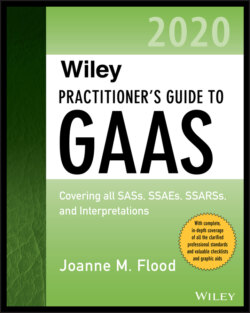Читать книгу Wiley Practitioner's Guide to GAAS 2020 - Joanne M. Flood - Страница 114
Evaluating Fraud Risk at or Near the Completion of Fieldwork
ОглавлениеThe auditor should, at or near the end of fieldwork, evaluate whether the results of auditing procedures and observations affect the earlier assessment of the risk of material misstatement due to fraud. When making this evaluation, the auditor with final responsibility for the audit should confirm that all audit team members have been communicating information about fraud risks to each other throughout the audit.
Responding to misstatements that may result from fraud. When misstatements are identified, the auditor should consider whether they are indicative of fraud. The auditor may need to consider the impact on materiality and other related responses.
If the auditor believes that the misstatements are fraudulent or may result from fraud, but the effect is not material to the financial statements, the auditor should evaluate the implications for the rest of the audit. If the auditor determines that there are implications, such as implications about management’s integrity, the auditor would reevaluate the assessment of the risk of material misstatement due to fraud and its impact on the nature, timing, and extent of substantive tests and the assessment of control risk if control risk were assessed below the maximum.
If the auditor believes that the misstatements are fraudulent or may result from fraud, and the effect is material (or if the auditor cannot evaluate the materiality of the effect), the auditor should:
1 Try to obtain additional evidence to determine whether fraud occurred and what its effect would be.
2 Consider how it affects the rest of the audit.
3 Discuss the matter and a plan for further investigation with a level of management at least one level above those involved, as well as senior management and those charged with governance (if senior management is involved, it may be appropriate for the auditor to hold the discussion with those charged with governance).
4 Consider suggesting that the client consult legal counsel.
After evaluating the risk of material misstatement, the auditor may determine that he or she should withdraw from the engagement and communicate the reason to those charged with governance. The auditor may wish to consult legal counsel when considering withdrawing from the engagement. (AU-C 240.38)
NOTE: Because of the wide variety of circumstances involved, it is not possible to definitively point out when the auditor should withdraw. However, the auditor may want to consider the implications of the fraud for management’s integrity and the cooperation and effectiveness of management and/or the board of directors when considering whether to withdraw.
